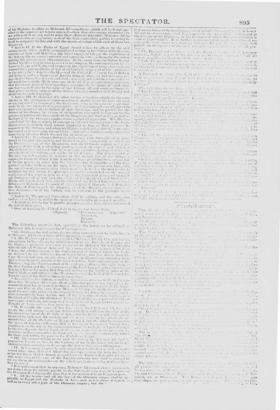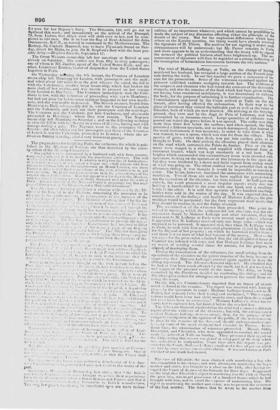for men for her Majesty's Navy. The Britannia, 120, will
go out to Spithead this week ; and immediately on the arrival of the Donegal, 78, from Lisbon, that ship's crew will shift over to her, and be com- pleted to 820 men. She is to bear the flag of Hear-Admiral Sir John Ommanney, K.C.B., as second in command in the Mediterranean. The Rodney, 92, Captain Maunsell, was to leave Plymouth Sound on Sun- day, direct for Malta, to joiu Sir It. Stopford's fleet with the least pos- sible delay.—Brighten Gtactle, September 17.
The Great Western steam-ship left her moorings at Bristol at one o'clock on Saturday. She carries out front fifty to sixty passengers ; one of whom is Mr. Jaudon, agent of the United States Bank, and an- other, Lieutenant Eustiec, bearer of despatches from the United States Legation in Paris.
On Wednesday meIrning the 9th instant, the Countess of Lonsdale steam-ship left Hamburg for London, with passengers and the mail ; and when about 120 miles from the port whence she sailed, she till in with the Caledonian, another large steam-ship, which had broken the main shaft of her engine, and was unable to proceed on her voyage from London to Hamburg. The Countess immediately took the Cale- donia in tow, with the intention of proceeding with her to Hamburg ; but had not gone far before some accident happened to her own machi- nery, and she was unable to proceed. The Severn strainer, bound front Hamburg to ITO, subsequently MI in with the Countess of 1,nnsdale and the Caledonia, and took out their passengers and the mail-bags. The Countess and the Caledonia pat into Cuxhaven, and afterwards proceeded to Hamburg ; where they now remain. The Neptune steam-ship left Hamburg on Saturday ; and on the following morning at nine she fell in with the Severn in a state of distress, having met with damage during a gale. The Neptune went to the assistance of the Severn ; and after raking out her passengers and those of the Countess of Lonsdsle and the Caledonia, proceeded to London ; where she ar- rived on Sunday r.oriting, after a very boisterous passage.



























 Previous page
Previous page